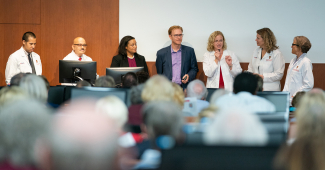
A maximum capacity crowd of nearly 700 people gathered at the Health Science Learning Center in Madison, Wisconsin, on September 18 for the third and final Mini Med School of 2019. Presenters showcased the cutting-edge Alzheimer’s disease research taking place at the UW. Emcee for the evening was Wisconsin Alzheimer’s Disease Research Center director, Sanjay Asthana, MD. Asthana guided attendees through four presentations that offered a glimpse at the hope on the horizon for the disease and profiled the UW’s quality care for patients, support for caregivers, research into early diagnosis, and commitment to emerging treatments for Alzheimer’s disease.
The first speaker of the evening, Nathaniel Chin, MD, offered an overview of Alzheimer’s disease and emphasized the importance of receiving a diagnosis. “There is power in information and knowing what is happening to you,” he said. That message is central to Chin’s unique Clinical Pathways memory clinic at UW Health, where he helps patients and families understand the various stages of the disease so they can seek the right care at the right time. Chin’s closing message reminded the audience that dementia planning is not just preparing for the bad things, but prioritizing the time you have in order to ensure a safe, joyful, fulfilling life.
Today, 16 million informal caregivers are supporting people with Alzheimer’s disease and other dementias. Among their myriad duties, they coordinate care and medical appointments, manage safe environments, oversee financial and legal duties, and offer companionship for their loved ones. They also experience high levels of stress and depression, and many report that caregiving has a negative impact on their health. Andrea Gilmore-Bykovskyi, PhD, RN, shared what researchers are doing to meet the needs of dementia caregivers through education and support, and described new technologies that help dementia patients stay safe in their homes.
With no effective treatments and no new FDA-approved drugs in 16 years, the treatment landscape for Alzheimer’s disease may seem bleak. But Cynthia Carlsson, MD, MS, detailed emerging treatments for Alzheimer’s disease and a new approach to clinical trials. By conducting research in people who are in the earliest stages of Alzheimer’s disease, scientists hope this approach through early interventions will be more successful than treating people in later stages of the disease. Clinical trials at the UW are looking at interventions to protect brain function with exercise, fish oil, and anti-amyloid treatments.
Utilizing advanced brain imaging, scientists can see early biological changes associated with Alzheimer’s disease up to two decades before a person experiences the symptoms of dementia. Sterling C. Johnson, PhD, detailed how his lab is using these technologies to understand when the disease is starting, how fast it’s progressing, and what the gap is between its biology and its symptoms. He is also using the science to measure the effect of prevention studies. So far, the science consistently shows us that a healthy lifestyle — blood pressure control, physical activity, sleep, and following the Mediterranean diet — is good for the brain, and may slow the effect of Alzheimer’s disease.
- Log in to post comments



